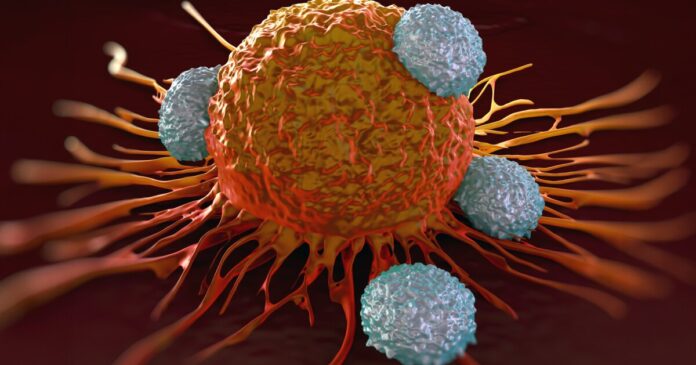Scientists have developed a hydrogel “rest stop” that shields cancer-fighting T cells, delaying their exhaustion and boosting their killing power. This game-changing strategy could supercharge immunotherapy by giving T cells time to regroup and hit harder.
Cancer immunotherapy supercharges the body’s own immune system to attack cancer cells, often relying on immune cells called T cells. However, for the treatment to be effective, those T cells need to be in peak fighting condition and not exhausted.
While previous studies have focused on revving up flagging T cells, new research led by the Chinese Academy of Sciences (CAS) has taken a new approach. Scientists have developed a protective barrier that physically separates T cells from cancer cells, allowing the immune cells to pause before they’re exhausted and enhancing their cancer-fighting abilities in the process.
“What if we could harness the concept of physical blocking to modulate the immune microenvironment?” asked Liang Xing-Jie, PhD, the study’s co-corresponding author and a professor at CAS’s National Center for Nanoscience and Technology. “What if a controllable barrier could regulate the T cell-tumor interaction and give T cells a break to delay their exhaustion?”
The researchers developed a biomimetic physical barrier, or BPB, using a special hydrogel that’s injected directly into the tumor. At body temperature, it transforms from a liquid into a semi-solid, effectively forming a temporary wall between T cells and cancer cells.
During this period of enforced rest, more progenitor exhausted T (Tpex) cells, a special subtype of T cells, accumulate. The term “progenitor” means the cells are early-stage or stem-like cells that haven’t fully matured yet. “Exhausted” refers to the fact that they’re part of the exhausted T cell lineage, which emerges when the immune system is constantly exposed to threats (such as tumor cells) and starts to wear out. So, Tpex cells are like army recruits that can grow into full soldiers, but haven’t fully burned out like their older counterparts.
The physical barrier allowed Tpex cells to build up safely inside the tumor without being pushed into full exhaustion by constant contact with cancer cells. When the barrier was removed, using near-infrared light to return the semi-solid gel to a liquid state, the researchers noticed that the Tpex cells were reactivated and had expanded into more potent, tumor-killing T cells. The result was a stronger, longer-lasting immune response against the cancer.
The process also led to the formation of an immune memory, which helps the body fight off the tumor if it tries to come back. When the researchers used their BPB with another immunotherapy, half of the tumors were completely cured in experimental models. The strategy also helped prevent the return of tumors and was effective against multiple tumors.
The present study has introduced a new way of thinking about immunotherapy: instead of just stimulating T cells non-stop, it gives them a scheduled break, improving their performance and longevity.
“We call this strategy ‘immunological rhythm control’,” said the study’s other corresponding author, Gong Ningqiang, PhD, a principal investigator at the University of Science and Technology of China (USTC). “By modulating the interaction between T cells and tumor cells, we intervene in the process of T cell exhaustion and preserve T cell functional activity to achieve a more effective immune response.”
Tpex cells are now seen as a key target for improving immunotherapy because they’ve been shown to respond well to treatment, and they can help by “rebooting” the immune system against cancer, even after it has started to fail. The research has also opened the door to combining the BPB technique with other cancer therapies to improve outcomes, especially in cases where traditional immunotherapies fall short.
The study was published in the journal PNAS.
Source: Chinese Academy of Sciences


